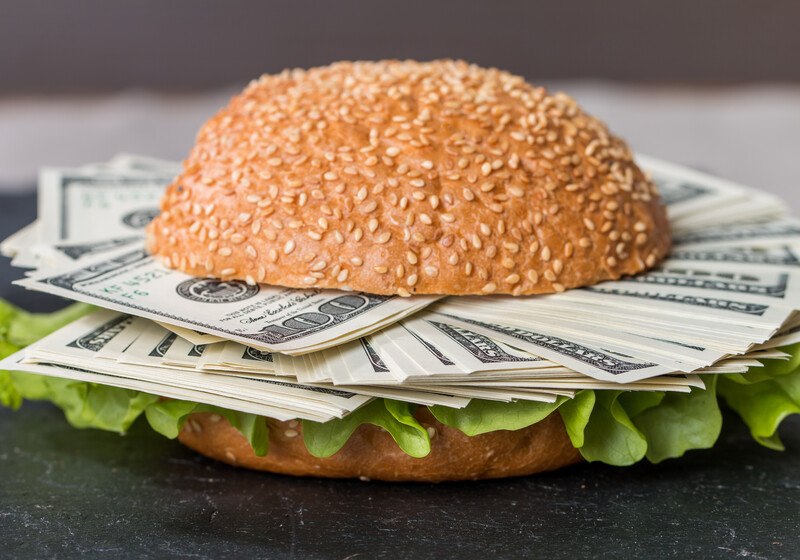
As you’ll find out below, food blogs can be outrageously profitable. I’m talking tens of thousands of dollars per month! You gotta put in some work to make it happen, but the good news is that you can cash in on your recipes or even diet advice without a college degree or extensive training, and you could eventually start working from home full time.
>>Build An Income-Generating Website That Lasts Decades!<<
—>>Watch how I built my business step-by-step in a few minutes.
—>>Earn online income for a lifetime.
>>Start Now<<
If you want your own food-related website, finding a good food blog name is an important early step. It can be a surprisingly challenging task for first-time website builders, to the point that some people never move on to making their site. “All the good names are already taken!!!!!” (Spoiler: They’re not!)
Here’s something that you should know – your food blog name doesn’t actually matter that much. Really. There are so many websites out there now and people are so used to browsing them endlessly, that your business name won’t have that much impact on the success of your blog. You certainly won’t fail just because your blog name wasn’t perfect. Any name that you choose can work, as it is your confidence and personality that sells your brand, not the name of the site.
Of course, you do still need to pick a name, which is where this post comes into play. In it, we’re looking at the processes of finding blog and domain names, getting a site up and running, and ways that you can make money from it.
- 50 Food Blog Name Ideas
- How To Choose A Good Food Blog Name
- Exact Match Keywords VS Branding
- How Much Should A Domain Name Cost?
- How To Build & Make Money From Your Food Website
- How Much Do Food Bloggers Make?
- Display Ads
- Affiliate Links
- Final Thoughts
- Should You Start Your Own Blog?
- How To Choose A Good Food Blog Name
50 Food Blog Name Ideas
- Delicious Nutritious Food
- Fun Yummy Delights
- Yum Oh Yum
- Tasty Treat Recipes
- That Raw Food Life
- Tasty Keto Treat
- Mike’s Tasty Treats
- Heartfelt Food Online
- Health Food for Everyone
- Slow Cooking 101
- Week Night Comfort Food
- This Meal Prep Chef
- Fiesty Foodie
- Modern Nutrition for Health
- Good Food for Thoughts
- Of Health and Food
- Food Hybrid
- Fine Cooking for Kids
- Warm Toasty Buns
- Not So Wholesome Food
- Elemeal
- The Bread Mom
- Meal Preppers Unite
- Mango in Her Garden
- Dessert Recipes From Scratch
- Vortex Food
- Super Fragrant Food
- Weeknight Budget Meals
- Great Mood Food
- Home Made Gluten Free
- The Colorful Cooker
- Dingbat Deli
- Real Foodie Group
- The Green Fig Leaf
- Cocktail Recipes World
- Cream Puff Blogger
- Scottish Mars Bars
- Best Baking Recipes Online
- My Delightful Food
- Weight Loss Dinner Recipes
- Muffin Bottom
- Go Party Recipes
- Crunchy Mom Recipes
- New York City Wine Bars
- Food with a Punch
- Cake Making For Pros
- Cartoon Cake Lady
- Easy Recipes For Dads
- Single Dads Dinners
- Deliciousness City
What do you think? Will any of these names instantly create an amazingly successful site? They won’t. The writing and the personality behind the website are what give the brand power, and that’s why the food blog arena will never be “saturated”. There’s always room for an engaging personality with delicious recipes or top-notch advice in whatever niche you choose.
 DSLR cameras are relatively inexpensive these days. A used Canon T5i (with lens) is about $400. A brand new T7i is about $800
DSLR cameras are relatively inexpensive these days. A used Canon T5i (with lens) is about $400. A brand new T7i is about $800How To Choose A Good Food Blog Name
Since you’re brainstorming names, I recommend spending some time thinking about what will make your blog stand out from the rest. You don’t have to be one of a kind, but “one of just a few” is a good thing to aim for. You don’t want your blog to be easily confused with your competitors. How many websites out there are called “The Vegan Foodie”, “Gluten Free Mama” or some derivative ?
Think about your target audience, your inspiration and what you want to talk about. What about your personality is unique? Though there is no shortage of allergen-free recipe sites out there, there’s only one of you! A keto blog for millennial professional women who need to meal plan on Sundays will be different from a keto recipe site for older men trying to lose weight and gain muscle, and still different from a Christian family switching doing keto-lite for the whole family.
For example, veganmuscleandfitness.com focuses on vegan meals for bodybuilders, but plantbasedjane.com focuses on vegan comfort foods.
Check to make sure the .com is available, but also check popular domain extensions like .net and org. Someone might have quicksnacksforkids.net, and if you buy quicksnacksforkids.com, there will definitely be some confusion there at best, and maybe legal issues at worst! For example, DamnDelicious.net is a massively popular website, but damdelicious.com doesn’t seem to be owned by the same people.
Social media availability is important too. One time, I tried to make a beer blog with an animal as its mascot. I went through about 15 different zoo animals before I found a Twitter handle that wasn’t taken.
It’s also worth avoiding common words or phrases for long term search engine optimization of your brand. For example, a website named Green Leaf would be frustrating for search engine optimization (SEO). There are probably 100 different restaurants and cafes around the country with the same name.
Google whatever name you’re considering. See what comes up. This should highlight what else is associated with the phrase that you’re considering. You don’t have to be the only one with this name, but it’s best if you are! You may find some Tumblr from 2014 who has the same name as you, but that doesn’t matter. Just watch out for big brands.
On the technical side of things, you should generally avoid using dashes, misspelled words and numbers. These all create more confusing domain names that can be tough for people to remember. Trust me. I know. Look at my own domain name.
These may seem like small details, but those details add up. I’ve been blogging full time since 2012 thanks to the website building and traffic training here.

Exact Match Keywords VS Branding
When choosing a domain name for your food blog, there are two schools of thought.
One idea is to use your “main keyword” ideally as an exact match. This type of domain does have some ranking advantage in search results. Something like LAFoodReviews.com is going to rank well when someone searches for “LA food reviews” in Google. A website named OrganicFoodBlog.com would rank well if someone searched “best organic food blogs online”.
You can do some keyword research and see if any high traffic keyword-based domain names are available. Many are taken already, because this is a well-known tactic to rank in search engines for competitive phrases, but there are always undiscovered gems out there.
The style also creates a strong link between the site name and purpose.
If you already have a keyword in mind, but the domain is unavailable, there are some simple tweaks you can make to get something similar enough and still get ranking advantage as well as easy topic recognizability. Example:
- OrganicFoodBlog.com ($1,295 at auction)
- OrganicFoodBlogger.com ($10)
- GlutenFreeBaking.com (taken, unavailable)
- MyGlutenFreeBaking.com ($10)
Still, you run the risk of being too similar to other sites (especially in a competitive niche), and relying on a keyword in the domain can make it more difficult to tweak your target audience over time.
Domains that are entirely keyword-focused can also end up being dry and boring, especially if your keyword phrase contains three or more words. BestBreweriesNorthernCalifornia.com doesn’t quite have the catchy brandability you should shoot for. Plus you don’t need to use an exact match domain to rank well in search engines. It’s just one metric of thousands which determine your rank.
The alternative to keywords is branded names. These provide much more flexibility and can be easier to promote because they are recognizable across all your online properties. For long-term success, this is awesome.
A branded name could be a word that has nothing much to do with your topic at hand or one that only has a rough association. Many famous brands do this, like Lindt or Hershey’s. While such names are strongly linked to chocolate now, the connection wouldn’t have been as obvious when they were first introduced.
Those are obviously people’s names, which you could use, but you can also make up things like TheKitchn, or Gimme Some Oven.
So what do you think? Will you choose a branded domain name, or go with a keyword optimized version?
 You don’t need a professional camera to have a successful food blog brand. Smartphone cameras are good enough, at least to get started!
You don’t need a professional camera to have a successful food blog brand. Smartphone cameras are good enough, at least to get started!How Much Should A Domain Name Cost?
Buying a domain name can be easily done from a domain name registrar. One of the most common is GoDaddy, partly because the domain names can be very “cheap”.
The truth is, many of these discount registrars will charge $0.99 for your first year of registration, then $19.99 every year after year. What you save initially is erased each year after that.
I spend between $10-$15 for a domain, but I always check the recurring pricing.
How To Build & Make Money From Your Food Website
Once you have a domain name to move forward with, the next question is how you’re going to build your site. This is another area where there are multiple options, but only one I recommend. Though builders like Wix, Weebly , and Squarespace are popular because they are “drag and drop” visual builders, long term, using those platforms will hurt your traffic and income.
Not only are they years behind in terms of search engine optimization, you’ll also have a hard time publishing recipes. They simply were not built for recipe blogs. Even if your food blog is information only, and not a recipe site per se, you will still have issues with monetization. Many ad networks struggle to integrate with these proprietary builders.
I always suggest a self-hosted WordPress site for anyone serious about long-term online income. Other services don’t give you nearly as much control. This level of control is critical for getting consistent traffic to your website and getting the precise outcomes that you want.
Thankfully, WordPress sites aren’t difficult to build. You can make a good-looking site as a complete beginner. This type of site also ends up being cheaper than most other options, especially if you choose your hosting provider well. Watch the video below to see how I made my own recipe blog in just 727 seconds. Here’s the WordPress website builder I use in the video.
How Much Do Food Bloggers Make?

Most food bloggers operate in the field of cooking, offering readers delicious recipes and various eating tips. Despite the sheer number of food blogs out there, many do make a considerable income from their passion.
One example of Cheryl from 40 Aprons. In January 2019 she earned a total of almost $37,000 from her website. Her expenses aren’t huge, so she still made more than $35,700 net income for the month.
She mentions that January 2019 was her best month yet and that January is an amazing month for her niche (health food), so she doesn’t earn that much every month. Even so, it’s easy to see that Cheryl is doing very well with her site.
Another amazing example is from Jenna at Butternut Bakery. She earned roughly $5,000 for that month (her net income was around $4,500).
While $5,000 might not seem like much compared to what Cheryl from 40 Aprons is earning, Jenna had only been running her blog for around a year at the time of the income report.
An even more impressive factor is that she still works a full-time job while running her website. Her experience proves that working online can easily start out as a side venture and grow from there.
One more current income report to check out and track is from A Sassy Spoon, which was making over $30,000 per month in 2019.
In other words, it’s not uncommon to earn six figures from a popular food blog. A lot of income is from ad revenue (see below), but you’ll also see income from a variety of sources like sponsored posts, affiliate links, consulting, and coaching.
In fact, if you really want to make money from a food blog, I highly recommend Food Blogger Pro. It’s amazing that they developed a whole training course specifically for food bloggers, rather than the typical “how to make money online” generalized advice. If you want to post your own recipes to a website and make money from it, that’s the place to be.
Of course, “food blog” can have many ideas. You might be just posting information about how to lose weight with a specific diet, or how to navigate the restaurant world with dietary restrictions. For example, a blog reviewing the best gluten free restaurants in LA could absolutely make money without posting recipes, but may still be considered a “food blog”.
To be clear, Food Blogger Pro is for recipe bloggers. If you are learning more towards lifestyle, diet, reviews, etc, then this training course is better.
Display Ads
You can’t get much easier than display ads as a way to make money. Ads are perfect for beginners, as you don’t need to manage them constantly. You could even just set the ads up once and then forget about them entirely. Or, you could use ad management plugins to exert more control.
How much you earn from ads is strongly linked to your traffic. Small sites with very little traffic don’t tend to earn much at all. As your traffic increases, your income should as well.
While ads can be slightly annoying, they’re also very useful for bloggers. Relying on ads means that your content doesn’t need to be associated with products at all. This is perfect for niches that don’t have any obvious connection to products.
There is a variety of ad networks out there that you can try. Google AdSense remains one of the most popular, although you can always try out different ad networks over time to find out the best one for your needs. Personally, I find that my earnings do way better with an ad management network.
Affiliate marketing is the other main approach that you can take. The style does involve more effort to learn and to implement. This is partly because you want some of your content to be associated with specific products.
Even so, affiliate marketing can earn you more money for less traffic. You also have plenty of flexibility and control. For example, you get to choose the products that you promote and even the precise ways that you promote them.
A key approach is to find affiliate programs that are relevant to your visitors. This includes looking for items and/or services that people are likely to purchase online. After all, you’re not likely to get many sales if you link people to something that they can easily buy at their local store.
Thankfully, there are plenty of amazing food affiliate programs out there. Here are some specific topics to consider, but really you can find just about anything online with an affiliate program. I’ve even sold stuff like cricket flour and coffee enemas (don’t ask!) on some of my sites in the past.
- meal kits affiliate programs
- food subscription boxes
- wine affiliate programs
- keto affiliate programs
Though recipe sites are extremely popular, and that’s what some folks mean when they say “food blog”, there really are a ton of angles you could go with. Who’s your target audience? Who are you writing for? Who are you trying to help?
- local restaurant reviews (local food critic)
- craft beer reviews
- traveling with dietary restrictions
- food photography
- whiskey education for beginners
- weight loss for families
Final Thoughts
Whether you want to rely on display ads, affiliate marketing or a bit of both, websites have many advantages. The domain name brand that you choose really doesn’t matter. There are plenty of quirky names out there already.
The simple truth is that any name will work, as long as you own it. This means that you should be focusing on the content you create and showcasing your own personality across the site. Those aspects will always be much more powerful than the domain name itself.
Besides, if you really hate your domain name down the road, you’re not completely stuck. You could use a domain redirect to change to a new domain name. Some authors even just change their site name and leave the domain name the same.
Should You Start Your Own Blog?
Honestly, the sad thing is that most people who want to start a blog get a domain name and a website set up, but never really do much beyond that. They are leaving a serious amount of money on the table!
If you want to actually make something of your site, and earn the kind of income that could allow you to quit your job and work full time online, then this members-only training site is what I recommend. If you’re serious about making some moves, they’re your best shot at building some fat traffic to your brand and profiting from your blog!
What’s up ladies and dudes! Great to finally meet you, and I hope you enjoyed this post. I started my first online business in 2010 promoting computer software and now I help newbies start their own businesses. Sign up for my #1 recommended training course and learn how to start your business for FREE!
